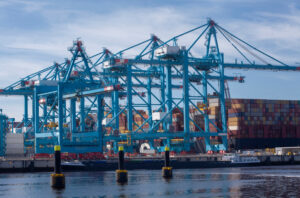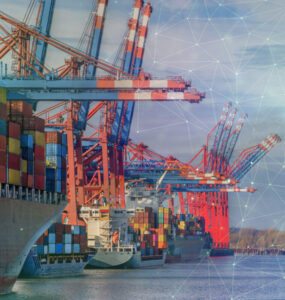Investment in inland shipping could be ‘useless’ in a decade if the industry fails to harness data exchange and provide ports with vital information, a project lead has told PTI.
A new project rolling out a centralised data exchange with the Ports of Antwerp, Port of Oostende, Port of Zeebrugge (now merged with the Port of Antwerp to become the Port of Antwerp-Bruges) and North Sea Port is set to modernise inland shipping
The data exchange platform, launched 4 January 2021, is also set to futureproof the sector as it vies for greater cargo traffic along the supply chain, according to Jef Bauwens, Project Manager of Smart Logistics at the River Information Services at De Vlaamse Waterweg nv.
The online reporting platform means skippers and shipping providers will only have to submit a single digital report containing route, cargo, and shipping data for waterways in Flanders and on the Western Scheldt.
“We have done a lot of interviews with logistics parties,” commented Bauwens. “If you look at the logistics chain today, they make use of trucks on the road more often than they make use of barges in the logistics chain – for goods that can transported on boatways.
“For some cargo, there is no need for it to be transported in an urgent way via road,” he added.
On 29 March – 1 April PTI will be hosting the Smart Digital Ports of the Future conference – featuring insight on how emerging technologies will transform shipping and the ports within it. Click here to register!
River transport for cargo can be significantly more beneficial for the environment than Heavy Goods Vehicles (HGVs): a 1000-tonne barge can replace 100 lorry journeys with just half of the emissions of road freight, for example. Further, barges that have engines comparable to that of trucks can carry 10 to 12 times the amount of freight, providing financial savings.
Bauwens laments however that the lack of real-time dynamic information is a key obstacle in growing inland shipping along the supply chain.
Explaining further, Bauwens said, “Logistic players make use of road transport just because they don’t trust the inland waterways. They don’t know it.
“They said it literally is because they don’t have the right information. That’s something we’ve also had to tell the barge owners: if you can provide good information to the whole logistic chain, then your business will be better in the future.”
Those who already report digitally do not have to bring new software on board – and can direct their information to the centralised hub.
However, for those who still report to every port along the route through analogue communications – through a counter or VHF radio, for example – Bauwens and his team are encouraging skippers to move to digital software to better inland shipping’s ‘pitch’ of its value for logistics providers.
“If we don’t anything today then in 10 years or 20 years we will be non-existent,” claimed Bauwens. “Every investment in a quay will be useless because there won’t be any barges.”
Whilst emerging technologies like autonomous barges and AI can make the case further for suppliers to utilise inland shipping, if data sharing is not established, the industry could be “nowhere,” says Bauwens.
“That’s the main reason we started this project,” he added. “Every step we take in this project is one step in making a better logistics world.”









